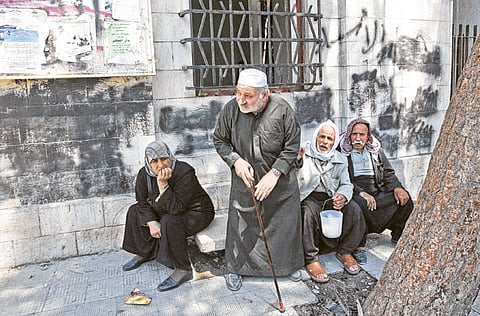Syria activists call for armed rebellion
Civil war in Syria could spread to Lebanon and Iraq, embroil Israel and destabilise the Gulf

Beirut: The success of Libya's revolutionaries in toppling their dictator is prompting calls within the Syrian opposition for armed rebellion and Nato intervention after nearly six months of overwhelmingly peaceful demonstrations that have failed to dislodge President Bashar Al Assad.
The young internet activists who have helped guide the uprising are arguing against the strategic shift. So too are the older dissidents who have long dreamed of the non-violent revolution now unfolding against a regime that has proved every bit as brutal as the one led by Libya's Muammar Gaddafi.
Read more stories on the unrest in the Middle East
But some activists have concluded that peaceful protests alone will not be enough to overthrow a government that has used live ammunition, tanks and artillery to try to crush its opponents, killing more than 2,000 and imprisoning tens of thousands.
Protesters in recent days have carried banners calling for a no-fly zone over Syria akin to the one that facilitated the Libyan revolt.
"We want any [intervention] that stops the killing, whether Arab or foreign," said one banner held by protesters in the beleaguered town of Homs.
Activists who have recently visited Homs say protesters there also have begun carrying assault rifles to defend against government attacks.
Videos have appeared on Facebook pages teaching activists how to make Molotov cocktails. Yet although US President Barack Obama called this month for Al Assad to step down, world powers, including the United States, have shown little appetite for any form of entanglement in Syria.
Unlike the Libyan rebels, who through force of arms swiftly seized control of the eastern portion of their country and were rewarded with a Nato-enforced no-fly zone, the Syrian protesters control no territory for a foreign military force to protect.
There is also no clearly identifiable group that can claim to represent the leaderless, disorganised and divided opposition. An armed rebellion in Syria, which straddles the region's most volatile ethnic and sectarian fault lines, would have ramifications far more profound than in Libya.
A civil war in Syria could spread beyond its borders to Lebanon and Iraq, perhaps embroil Israel and destabilise the countries of the Gulf. But some see the drift toward violent rebellion as inevitable.
"If things stay like this another one or two months, it will happen whether we want it or not," said a Damascus-based engineer who has given up attending protests because of the escalating brutality of the security forces but says he would join an armed revolt.
"A lot of people are threatening to do it, and even in Damascus, people are talking about getting guns," he said, speaking via Skype.
So far, instances of armed resistance have been rare, despite attempts by the Al Assad government to portray the demonstrators as violent extremists. By arming themselves, activists say, protesters would be playing into Al Assad's hands, allowing him to justify even harsher tactics against the opposition.
"I know that if the revolution is armed, the human toll would be five to 10 times the current toll," said Amr Al Sadeq, the name used by the Damascus-based spokesman and founder of the Syrian Revolution Coordinators Union, one of the leading groups that organises and reports on protests.
"The Syrians have shown great bravery withstanding guns, torture and detention with only their bare chests," he added. "But you cannot count on this marvelous attitude of the Syrian people lasting forever."


